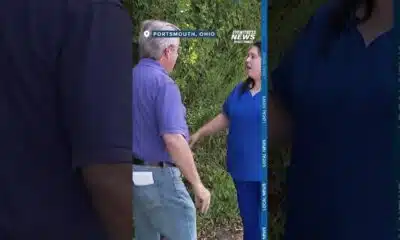News from the South - Texas News Feed
Texas parents, teachers worry about parental rights bills
“Texas parents and teachers worry bills to root out liberal sway from public schools pave the way for conservative bias” was first published by The Texas Tribune, a nonprofit, nonpartisan media organization that informs Texans — and engages with them — about public policy, politics, government and statewide issues.
Sign up for The Brief, The Texas Tribune’s daily newsletter that keeps readers up to speed on the most essential Texas news.
Halcyon Ramsey, a mother of three children in the McKinney school district, is active in her kids’ elementary and middle schools. She knows how to reach administrators and has many teachers’ cellphone numbers. Ramsey values having a voice in what her children will be taught, especially when schools are preparing to discuss complex topics like sexuality.
“I get a permission slip, and then I have an opportunity to preview and see what they’re going to show to determine if I give my permission,” she said. “So as a parent, I feel like my rights are being acknowledged, because I have the option to opt out.”
During this year’s legislative session, Republican lawmakers championed several proposals advocating for parents’ right to guide their children’s education in public schools, a sentiment Ramsey agrees with. Supporters of the legislation say it will give parents more control over their children’s learning and push back against what they criticize as liberal bias in instruction.
But Ramsey worries that some new laws might do more harm than good.
Some teachers and parents note that Texas schools already have ways to take in feedback from families, and many work closely with parents in determining school activities and teaching plans. They say efforts to eliminate ideological bias in the classroom are contradicted by other conservative proposals approved this year that seek to push schools to the right. Ultimately, they warn, the proposals will further fan the flames of culture wars in schools, strain the trust between parents and teachers, and make it more difficult to navigate classroom instruction.
“I think when you have too many opinions and too many things involved, it muddies the water, then we don’t get anything done,” Ramsey said.
Frustration with schools
The push for more parental involvement in schools gained traction during the COVID-19 pandemic, when schools closed and switched to remote learning. It led to plummeting grades and created challenges for many parents, who suddenly had to find child care during the day. Schools also introduced mask and vaccine requirements, which conflicted with some families’ personal beliefs.
Frustrations with public schools eventually extended to classroom instruction. Conservative groups said the way schools taught children about issues like race, racism, sex and gender amounted to forcing leftist ideologies onto students, and that parents should have the power to push back.
Lawmakers echoed concerns that classrooms had become too politicized and that taxpayers’ money was being used to promote certain ideologies. Conservative criticism led to legislation in 2021 banning public schools from teaching critical race theory, a college-level field of study that explores how race and racism influence laws and institutions, despite the discipline not being taught in K-12 schools. In 2023, the Texas Legislature approved a law prohibiting school libraries from acquiring or keeping sexually explicit materials, which was partially blocked last year.
This session, many bills, big and small, sought to build on those efforts.
Senate Bill 12, which supporters dubbed the Parental Bill of Rights, aims to give parents more authority over their children’s curriculum and extracurricular activities. The bill’s goal is to help parents “make informed choices that align with their family’s values,” Rep. Jeff Leach, the bill’s sponsor, said on the Texas House floor in May.
The legislation, which is headed to Gov. Greg Abbott’s desk, will also ban Texas schools from considering diversity, equity and inclusion when hiring or training staff, as well as prohibit student clubs related to sexual orientation and gender identity.
Under the law, parents must approve their child’s participation in club activities. They will be able to report school employees whom they believe are violating the DEI ban to the principal. If they’re not satisfied with the school’s response, they can appeal to the Texas education commissioner, who can investigate the complaint and conduct a hearing.
Meanwhile, one of the central arguments for Senate Bill 2, which will create a school voucher program in Texas that will allow families to use taxpayer funds to pay for their children’s private schooling, was to make it easier for parents to opt out of public schools they believe are underperforming academically or unsafe.
Other bills approved this year include Senate Bill 13, which will allow parents to have a bigger role in approving or challenging any school library materials, and Senate Bill 204, which orders the creation of a handbook outlining the ways in which parents can influence their schools.
Mandy Drogin, a campaign director with the conservative think tank Texas Public Policy Foundation and a school voucher advocate, said she believes legislation approved this session will give more control to parents worried that what their children are learning in classrooms contradicts some families’ traditional values.
But Rep. Gene Wu, D-Houston, a critic of those efforts, said the bills don’t give parents anything they didn’t have before.
Even before the recent parental rights movement, families have been encouraged to reach out to their school board members or participate in parent-teacher associations to advocate for changes and improvements in their children’s schools. According to Charles Butt Foundation research, nine in 10 Texas public school parents feel comfortable communicating with teachers on safety, academic performance and mental health.
Before the passage of the school libraries bill, parents already had ways to provide input on what content their children could access, Wu said.
He also criticized a feature of the bill that will allow school boards to oversee book approvals and removals, or delegate that responsibility to local school advisory councils if parents in a district sign a petition allowing their creation. The bill requires only 50 parents or 10% of parents in the district, whichever is less, to sign the petition.
“If a parent really objected to a book, they could have gone to the library. They could have gone to the school. They go talk to the school board,” Wu told The Texas Tribune. “What these bills do is allow a very small minority to override and to control the process.”
Like other priority Republican legislation this year, Wu said, parental rights bills misrepresent what they do. During the Texas House debate on the DEI ban on K-12 schools last month, he blasted Leach for referring to LGBTQ+ student groups as “sex clubs.”
“Just like school vouchers are really about school choice, banning books is really couched as parental rights,” he said. “This has been the consistent M.O. of the religious right, of the Republican right, for a long time now. You call things what [they are] not. And after a while, you say it enough times, the lie becomes true.”
“That is a culture war”
For Nicole Hill, communications director for Texas’ chapter of the American Federation of Teachers, these bills will ultimately limit how children behave and what they read.
“That’s not parents’ rights. That is a culture war,” Hill said of legislation like the K-12 DEI ban and the school libraries bill. “It’s nothing to do with an actual parent’s right to be involved in their child’s education and to have all the information they need to make good choices.”
Hill said some teachers worry the new legislation will make it harder to teach certain topics and increase self-censorship among educators fearful of getting reported.
For Drogin, teachers should exercise a certain level of restraint. For instance, she criticized teachers who have read in class, “My Shadow Is Purple,” a children’s picture book about gender identity. Drogin said that kind of material doesn’t belong in the classroom.
Teachers “should be self-censoring. That has no business in a classroom with children,” she said. “If parents want to read those books to their children, by all means, you can go on Amazon and buy it, but my tax dollars and my children should not be exposed to that ideology, which is a radical ideology.”
Some teachers said the vague language of the new bills leaves many unsure of what is actually prohibited.
Rachel Preston, who teaches AP French language and culture at the Liberal Arts and Science Academy in Austin, said she’s rethinking her curriculum. She’s concerned that some topics she teaches could be misunderstood or taken out of context under the DEI ban. For instance, her textbook includes a section titled “La sexualité,” which she fears could be misinterpreted under the new rules and viewed as the promotion of a certain ideology.
“We talk about gender issues, and sometimes sexuality comes up in that. But this is a college-level coursework that we’re expected to deal with in high school. So it just feels like it will make teaching my AP class a lot harder next year when I get around to those issues,” she said.
Megan Holden, an English and AP art history teacher at Bowie High School in Austin, said she’s concerned that teachers won’t know what to expect from parents. Every parent has their own views, she said, which will make it hard for teachers to know what’s considered acceptable.
“We’re not even sure what parents are looking for, and so we have to guess that,” Holden said. “We have to guess what might be offensive to every parent, which is a lot to have to figure out.”
Preston and Holden pushed back against the notion that teachers are trying to indoctrinate children.
“We don’t tell them what to think. We tell them how to think. It’s the how, not the what, and it feels like it’s being assumed that we’re telling them the what,” Preston said.
Ramsey, the McKinney ISD mom, agrees with the idea that classrooms shouldn’t be used to promote any ideology. However, she said other bills prioritized by GOP legislators and approved this session seem to do just that. She pointed to Senate Bill 10, which will require schools to display the Ten Commandments in classrooms.
Ramsey is concerned that, in trying to keep ideology out of the classroom, lawmakers are actually depriving students of important knowledge and exposing them to more political influence.
“I feel like that is under attack here in Texas, the freedom to have a child actually be educated without being indoctrinated with religion,” Ramsey said. “I want my children to be able to make choices in their life based on what they have been taught at home, not what is being controlled and put in their heads at school, and I see public education headed in the wrong direction based on the decisions that the Legislature is making.”
Disclosure: Amazon Web Services (AWS) and Texas Public Policy Foundation have been financial supporters of The Texas Tribune, a nonprofit, nonpartisan news organization that is funded in part by donations from members, foundations and corporate sponsors. Financial supporters play no role in the Tribune’s journalism. Find a complete list of them here.
Big news: 20 more speakers join the TribFest lineup! New additions include Margaret Spellings, former U.S. secretary of education and CEO of the Bipartisan Policy Center; Michael Curry, former presiding bishop and primate of The Episcopal Church; Beto O’Rourke, former U.S. Representative, D-El Paso; Joe Lonsdale, entrepreneur, founder and managing partner at 8VC; and Katie Phang, journalist and trial lawyer.
TribFest 2025 is presented by JPMorganChase.
This article originally appeared in The Texas Tribune at https://www.texastribune.org/2025/06/12/texas-parental-rights-bills/.
The Texas Tribune is a member-supported, nonpartisan newsroom informing and engaging Texans on state politics and policy. Learn more at texastribune.org.
The post Texas parents, teachers worry about parental rights bills appeared first on feeds.texastribune.org
Note: The following A.I. based commentary is not part of the original article, reproduced above, but is offered in the hopes that it will promote greater media literacy and critical thinking, by making any potential bias more visible to the reader –Staff Editor.
Political Bias Rating: Center-Right
This article presents a largely centrist report with a slight tilt toward a conservative viewpoint. It frames parental rights and conservative legislative efforts in Texas schools as key issues, presenting Republican lawmakers’ push for parental control and critiques of liberal ideologies prominently. However, it also includes substantial voices of opposition—teachers, Democrats, and critics—who raise concerns about potential negative consequences and overreach by these laws. The balanced inclusion of multiple perspectives, including critiques of conservative policies and Republican supporters’ rationale, results in mostly neutral reporting with a slight leaning toward Center-Right due to the overall framing around parental rights and conservative legislative initiatives.
News from the South - Texas News Feed
Frustrated with poor play against UTEP, Arch Manning will 'get back to basics'
SUMMARY: Texas quarterback Arch Manning and coach Steve Sarkisian acknowledge the team’s underwhelming offensive performance in a 27-10 win over UTEP. Manning completed 11 of 25 passes for 114 yards with a touchdown and an interception, frustrating fans expecting a stronger showing at home. Despite a rough first half with 10 consecutive incompletions, Manning showed flashes of promise and scored twice on the ground. Sarkisian emphasized Manning’s mental struggle rather than physical injury and expressed confidence in his growth and consistency. Manning committed to improving fundamentals and handling in-game pressure ahead of tougher matchups, including their SEC opener against Florida on Oct. 4.
The post Frustrated with poor play against UTEP, Arch Manning will 'get back to basics' appeared first on www.kxan.com
News from the South - Texas News Feed
Austin becoming FEMA-approved emergency alert authority, planning 1st test alert
SUMMARY: On Monday, Sept. 29, Austin will conduct a test of the Integrated Public Alert and Warning System (IPAWS), becoming a FEMA-approved alerting authority able to send emergency alerts via Wireless Emergency Alerts (WEA) to cell phones and Emergency Alert System (EAS) messages to TV and radio. This coordinated test at 3 p.m. will cover the city across its three counties—Travis, Hays, and Williamson. The alerts will clearly indicate a test and require no action. IPAWS allows authenticated, geotargeted emergency notifications without subscription, enhancing public safety communication. More details are available at ReadyCentralTexas.org and Ready.gov/alerts.
The post Austin becoming FEMA-approved emergency alert authority, planning 1st test alert appeared first on www.kxan.com
News from the South - Texas News Feed
La Niña now expected to last all winter
SUMMARY: For the first time this year, La Niña is now forecast to last throughout the entire winter, with NOAA’s Climate Prediction Center giving it a 54% chance for December-February. Previously, ENSO Neutral was favored for winter. La Niña occurs when sea surface temperatures in the eastern equatorial Pacific are 0.5ºC below average, typically pushing the Pacific Jet Stream north, causing drier, warmer conditions in the southern U.S. and wetter areas in the Pacific Northwest. Last winter, a weak La Niña brought a record warm December but cooler January-February, below-average rainfall, snow in Austin, and more freezes than normal. Another mild La Niña winter is expected for Central Texas.
The post La Niña now expected to last all winter appeared first on www.kxan.com
-
News from the South - West Virginia News Feed7 days ago
Protesters in D.C. flood the streets demanding an end to Trump’s military deployment
-
News from the South - Missouri News Feed7 days ago
1587 Prime gives first look at food, cocktail menu ahead of grand opening in KC
-
News from the South - Arkansas News Feed6 days ago
‘One Pill Can Kill’ program aims to reduce opioid drug overdose
-
Mississippi News Video7 days ago
Interview: Come see Baptist at WTVA Senior Health Fair
-
News from the South - Alabama News Feed6 days ago
Alabama lawmaker revives bill to allow chaplains in public schools
-
The Conversation7 days ago
How is paint made?
-
News from the South - Arkansas News Feed6 days ago
Arkansas’s morning headlines | Sept. 9, 2025
-
News from the South - Missouri News Feed6 days ago
Pulaski County town faces scrutiny after fatal overdose











































